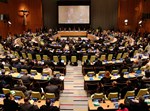Social Watch news
Published on Wed, 2016-08-24 14:37
Bulgaria has come a long way from its turbulent political and economic transition in the 1990s to becoming a member of the European Union (EU) in January 2007. Today, it is an upper middle-income economy of 7.2 million people with a per capita income of USD7,420. (GNI per capita, 2014).
However, since 2008, economic growth has been sluggish and income gains of the bottom 40 percent of the population have been weak. Supported by prudent macro-fiscal management, Bulgaria showed resilience during the global economic crisis with reduced imbalances and a sound public debt level (27.6% of GDP in 2014). Yet, convergence has slowed and Bulgaria’s income per capita are just 45 percent of the EU average in 2013. Eurostat data show that in 2014, Bulgaria holds second place in the at-risk-of-poverty-or-social-exclusion scale: Romania (40.2 %), Bulgaria (40.1 %) and Greece (36.0 %). The crisis and the measures taken to freeze income exacerbated social inequality and the chances of nearly half of the population to get out of the trap of poverty and social exclusion. Given this situation, what must be done to implement the 2030 Agenda?
|
Published on Mon, 2016-08-22 23:39
Are a country’s obligations under international human rights law relevant in interpreting its potential liability under investment treaties? Does a company’s responsibility to respect human rights come into play when assessing which of its expectations should be protected in an investment dispute? When important public interest implications of investment treaty interpretations are at stake in the resolution of a company’s treaty-based claims against a government, can amicus curiae –“friend of the court” –briefs help fill in gaps in the parties’ own submissions?
These and similar questions are increasingly being asked as international lawyers grapple with the implications of investment treaty disputes for public policymaking and the fulfillment of human rights, as well as with the continued fragmentation of international law. These questions are particularly important in the context of specific investment disputes that stand to affect the rights of third parties.
|
Published on Mon, 2016-08-22 17:27
Spain is in a period of uncertainty about its future government and its institutions, political parties and citizens have not yet decided on a sustainable development strategy. To adapt and implement the Sustainable Development Goals (SDGs), Spain would need to renew its commitment to freedoms, rights and equality. The country has the capacity to transition towards renewable energy, but it needs to change social and economic policies to cope with dramatic unemployment. There is room to expand fiscal policy given its low tax revenue in relation to neighbouring countries, and domestic rates of poverty and inequality require prioritizing specific policies in order to reduce them.
|
Published on Mon, 2016-08-22 17:23
Canada's newly-elected federal Liberal government has committed to working towards achieving the goals set out in the 2030 Agenda “both at home and abroad.” However, the Government inherits a country that has been profoundly shaped by the conservative economic and social policies of the past decade. The new government will have to overcome the challenges posed by a much-diminished federal government, social and income inequality, and an economy based on growing wealth rather than wages in order to deliver on its commitment to achieving the Sustainable Development Goals.
In sharp contrast to the previous federal Conservative government, the current government has committed itself to resumed deficit spending. However, even with the increases seen in their first budget, federal programme spending remains at a historic low. Today, federal programme spending as a share of the economy stands at 13 percent of GDP, its lowest point in the past 60 years.
|
Published on Wed, 2016-08-17 23:36

Photo: IAA
|
Iraqi Al-Amal Association (IAA), Social Watch focal point in Iraq, conducted its second workshop in Beirut, to discuss the draft bill on “Protection against Domestic Violence".
Activist Hanaa Edwar head of IAA said "Our aim is to explain and discuss the important bill, and to work with the MPs and consultants, in order to reach the full conviction required to adopt and defend this bill, which we hope that the current session of the House of Representatives will be able to vote on and pass it”. Adding: "this law will be a real shield against domestic violence, committed by one family member against another reaching to a relative of the fourth degree, mostly women and children are the victims of such practices, which constitute a hidden crime. The bill includes mechanisms for the protection of victims such as creating safe centers and providing the necessary care and rehabilitation, and to punish the perpetrators of these crimes. Also, there are other steps that could be taken by the media and civil society organizations and other parties to limit the phenomenon of domestic violence, which escalated to levels that cannot be tolerated”.
|
Published on Wed, 2016-08-17 20:11
The coup currently on course in Brazil, with great chance of succeeding in the next 30 days, has many faces and short- and long-term effects for the Brazilian population. In little over 100 days of interim government, the politically conservative and economically liberal agenda is being rapidly designed and raising fear among the most vulnerable sectors of the society, such as workers and retirees. It is now clear that the nebulous process of impeachment endangers historical achievements and the very capacity of the Brazilian state to deal with its historical ills.
Regarding workers and retirees, sweeping reforms of the labor and welfare systems that would produce significant regressions on their rights are already well under way to implementation, without any concern about the legitimacy or the screen of the ballot boxes. Indeed, many take for granted their approval if the impeachment process goes ahead in the Federal Senate.
|
Published on Mon, 2016-08-15 14:40

A session of the HLPF. (Photo: UN)
|
The United Nations High-Level Political Forum (HLPF) met in New York from 11 to 20 July 2016. It is the central UN body addressing sustainable development, and its chief task is to monitor the implementation of the 2030 Agenda and its global Sustainable Development Goals (SDGs).
The HLPF is an intergovernmental Forum in which all 193 Member States of the United Nations can take part. In addition, representatives of major groups and civil society organizations have far-reaching options to participate. However, the Forum neither has any concrete decision-making powers nor does it perform a direct coordinating role vis-à-vis governments and UN organizations. It primarily serves the purpose of sharing information on strategies to implement the 2030 Agenda, presenting national (success) stories and critically analyzing obstacles and setbacks in achieving the SDGs.
|
Published on Fri, 2016-08-12 18:59
The main challenge in implementing the 2030 Agenda in Finland will be integrating the principles and targets of sustainable development into all of the country's domestic policies, including those policies related to developing countries. Genuine political commitment is a prerequisite for implementing the 2030 Agenda broadly and coherently throughout the public administration. Different stakeholders have to be engaged and also take responsibility for implementing the goals. Implementation has to be monitored not only globally but also regionally.
This requires sufficient planning, coordination and allocation of resources, which in turn requires political commitment to implementing the universal goals but also prioritizing policy actions in order to get a serious and efficient start. Committing to the goals means that attaining them is mainstreamed into all decision-making, and not just considered in a separate action plan. It is important to understand the 2030 Agenda in a holistic way, so that for example gender equality is not only a separate goal but also a cross-cutting theme.
|
Published on Fri, 2016-08-12 18:56
The incorporation of the 2030 Agenda and the SDGs into the national development plan-- Eleventh Malaysia Plan 2016-2020 –and Malaysia’s approach to the SDGs demonstrate the same neoliberal biases, aims and agenda of all development plans since 2009. Will it belie the same fetishes for GDP or market/corporate stratagems instead of real socio-economic development plans? Does it package structural adjustment and austerity plans in the guise of ‘rationalizing’ and ‘integrating’ limited resources, funding and collaborative programmes? Will the imaginary crisis of a ‘middle-income trap’ continue to occupy the policy agenda, as opposed to the real crisis of the increasing income divide between the few who have and the many who have not?
|
Published on Fri, 2016-08-12 12:15
 |
A fundamental distinction that has come to the foreground with the onset of the economic crisis has been between the European Union (EU) rules and those of the Council of Europe. Indeed, the study of human social rights at the European level must include this dual perspective. That is because the European Social Charter Treaty (“the Charter” or “the ESC”), adopted within the Council of Europe, allows individuals to demand rights that are being violated by quite restrictive tax, labor, commercial and other legislative reforms and measures being imposed as a requirement by some European community institutions. These are, in particular, those that are part of the troika (which comprises the International Monetary Fund, the European Commission and the European Central Bank). The measures come attached to financial assistance being received by some countries in order to overcome the situation of bankruptcy in which they find themselves, or are the consequence of some rulings by the Court of Justice of the European Union.
|
SUSCRIBE TO OUR NEWSLETTER
Submit

|










